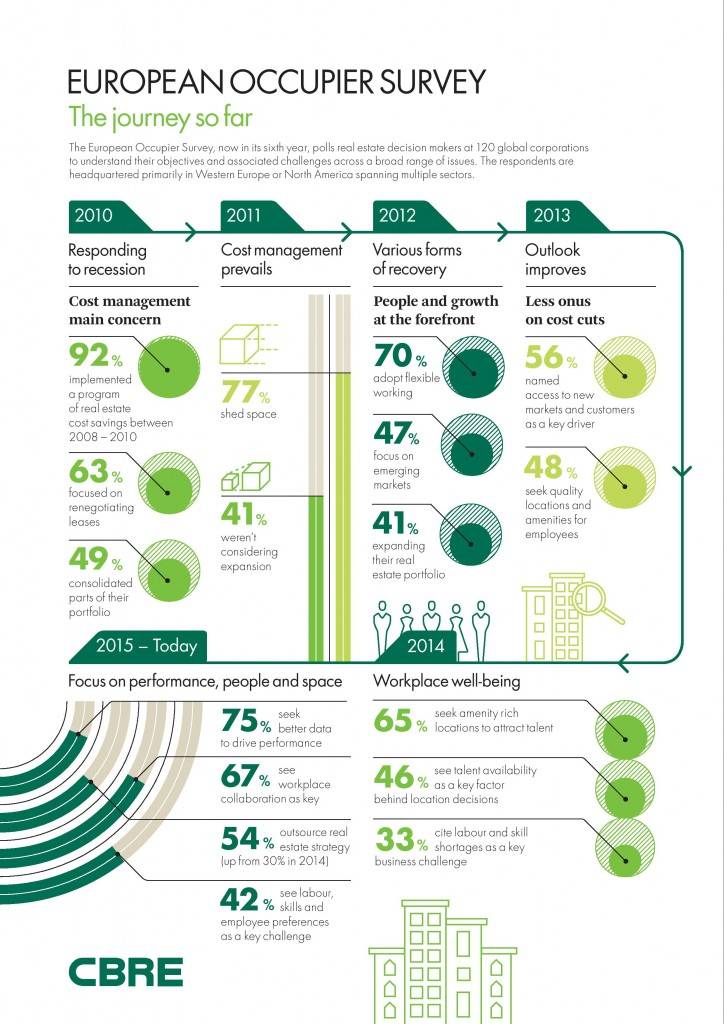January 18, 2016
Firms demanding more data about workplaces…and they’re about to get it 0
 Companies are increasingly focussed on generating workplace data as they seek to make better decisions about the ways their real estate supports their key organisational objectives. That is one of the key findings of the latest European Occupier Survey from property consultants CBRE (login required). The good news (or bad news, depending on your point of view) is they’re about to get it in spades, according to another study from researchers International Data Corporation which found that there will be a huge surge in the availability of Big Data infrastructure in EMEA countries over the next four years. The acquisition of data about buildings and their inhabitants remains a troublesome issue, especially when executives do things like introduce sensors to monitor working patterns of employees without their knowledge, as bosses at The Telegraph found in a very public way recently.
Companies are increasingly focussed on generating workplace data as they seek to make better decisions about the ways their real estate supports their key organisational objectives. That is one of the key findings of the latest European Occupier Survey from property consultants CBRE (login required). The good news (or bad news, depending on your point of view) is they’re about to get it in spades, according to another study from researchers International Data Corporation which found that there will be a huge surge in the availability of Big Data infrastructure in EMEA countries over the next four years. The acquisition of data about buildings and their inhabitants remains a troublesome issue, especially when executives do things like introduce sensors to monitor working patterns of employees without their knowledge, as bosses at The Telegraph found in a very public way recently.
 The CBRE survey, now in its sixth year, polls real estate decision-makers at 120 global corporations to understand their objectives and associated challenges across a broad range of issues. It claims that more than two-thirds of those polled count workplace collaboration as important and three-quarters are looking for better data about what goes on in the workplace.
The CBRE survey, now in its sixth year, polls real estate decision-makers at 120 global corporations to understand their objectives and associated challenges across a broad range of issues. It claims that more than two-thirds of those polled count workplace collaboration as important and three-quarters are looking for better data about what goes on in the workplace.
Richard Holberton, EMEA Head of Occupier Research at CBRE, commented: “A significant overhead, and in many cases the largest, for a company is the cost of its people. Increasingly companies want to maximise the return on human capital by providing workspaces that promote choice, collaboration and high levels of employee satisfaction, to attract the best staff and to support their brand. Likewise, employees want a voice – whether that’s the location of work, flexible working or a say in the office layout. This means there is ongoing recognition that the workplace must provide a high quality experience to entice and retain staff. It’s therefore not surprising that 74 percent of companies report having a wellness programme, two-thirds see labour and skills as important factors in global location strategies, and a further 67 percent believe deploying a workplace strategy enables better collaboration with customers and colleagues.”
According to the study, a majority of organisations now believe that there is aclose link between organisation and individual performance and the way they manage their properties. In turn, this depends on acquiring and applying data. Accordingly 75 percent of companies now regard better, more accurate data as the single most important factor in supporting corporate real estate strategy and identifying new opportunities.
This is clearly one of the main factors driving the growth in Big Data infrastructure according to the IDC study of markets in EMEA. Big Data-related server shipments will jump from 6 per cent this year to 16 per cent by 2019. The business is currently valued at $1 billion (£700m), but will be worth $2.7bn (£1.88bn) by the same year. The storage capacity will reach 20 exabytes over that period. To put this into context, all of the words ever uttered by human beings has been estimated at around 5 billion exabytes of data.
“Big Data and analytics have risen to the top of executives’ and developers’ agendas as the technology has evolved and mindsets are starting to change in organizations in EMEA,” said Andreas Olah, senior research analyst, European Datacenters and Big Data, IDC. “The main challenge is not the data or its volume, but the ability to generate value from it. “Many customers are still at the beginning of their journey and still don’t know where to start. Others have high ambitions and clear ideas but are slowed down by increasing complexities and the lack of highly skilled data scientists and developers.















